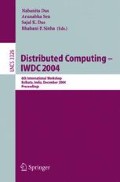Abstract
The classical Ricart-Agrawala algorithm (RA) has long been considered the most efficient fair mutual exclusion algorithm in distributed message-passing systems. The algorithm requires 2(N – 1) messages per critical section access, where N is the number of processes in the system. Recently, Lodha-Kshemkalyani proposed an improved fair algorithm (LK) that requires between N and 2(N – 1) messages per critical section access, and without any extra overhead. The exact number of messages depends on the concurrency of requests, and is difficult to prove or analyze theoretically. This paper shows the superior performance of LK over RA using extensive simulations under a wide range of critical section access patterns and network loads.
Access this chapter
Tax calculation will be finalised at checkout
Purchases are for personal use only
Preview
Unable to display preview. Download preview PDF.
References
Chandra, P., Gambhire, P., Kshemkalyani, A.D.: Performance of the Optimal Causal Multicast Algorithm: A Statistical Analysis. IEEE Transactions on Parallel and Distributed Systems 15(1), 40–52 (2004)
Chang, Y.-I.: A Simulation Study on Distributed Mutual Exclusion. J. Parallel and Distributed Computing 33(2), 107–121 (1996)
Floyd, S., Paxson, V.: Difficulties in Simulating the Internet. IEEE/ACM Transactions on Networking 9(4), 392–403 (2001)
Lamport, L.: Time, Clocks and the Ordering of Events in Distributed Systems. Comm. ACM 21(7), 558–565 (1978)
Lodha, S., Kshemkalyani, A.: A Fair Distributed Mutual Exclusion Algorithm. IEEE Trans. on Parallel and Distributed Systems 11(6), 537–549 (2000)
OPNET, Available at: http://www.opnet.com/products/modeler/home.html
Ricart, G., Agrawala, A.K.: An Optimal Algorithm for Mutual Exclusion in Computer Networks. Comm. ACM 24(1), 9–17 (1981)
Singhal, M.: A Taxonomy of Distributed Mutual Exclusion. J. Parallel and Distributed Computing 18(1), 94–101 (1993)
Author information
Authors and Affiliations
Editor information
Editors and Affiliations
Rights and permissions
Copyright information
© 2004 Springer-Verlag Berlin Heidelberg
About this paper
Cite this paper
Jani, K., Kshemkalyani, A.D. (2004). Performance of Fair Distributed Mutual Exclusion Algorithms. In: Sen, A., Das, N., Das, S.K., Sinha, B.P. (eds) Distributed Computing - IWDC 2004. IWDC 2004. Lecture Notes in Computer Science, vol 3326. Springer, Berlin, Heidelberg. https://doi.org/10.1007/978-3-540-30536-1_2
Download citation
DOI: https://doi.org/10.1007/978-3-540-30536-1_2
Publisher Name: Springer, Berlin, Heidelberg
Print ISBN: 978-3-540-24076-1
Online ISBN: 978-3-540-30536-1
eBook Packages: Computer ScienceComputer Science (R0)

